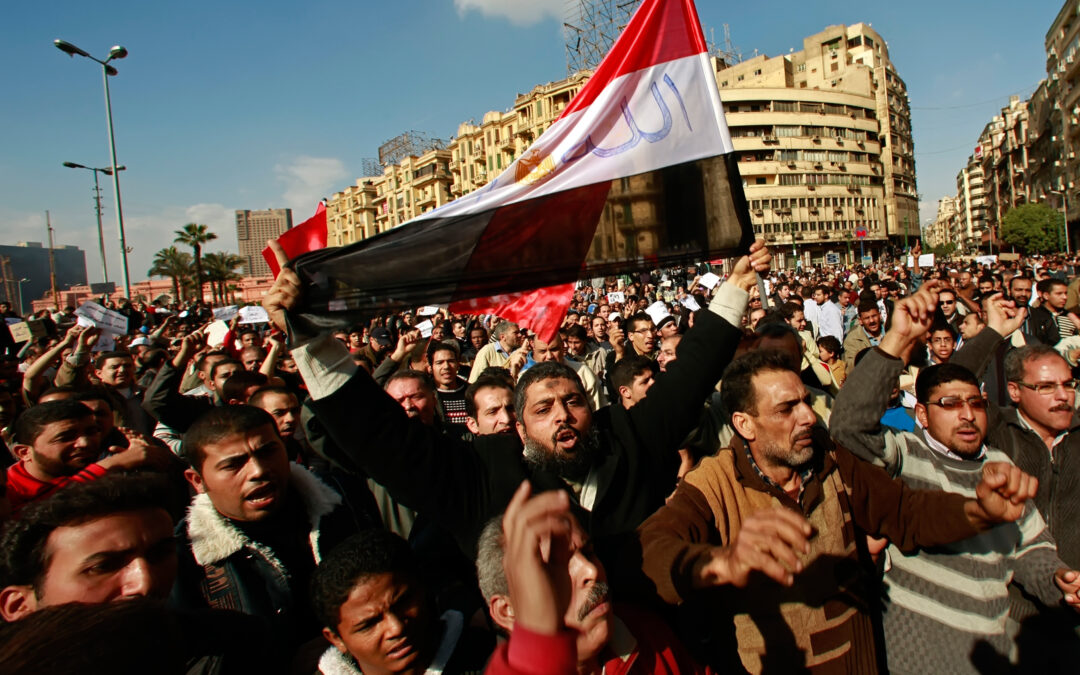
Sep 10, 2018 | News
Today, the ICJ condemned the mass convictions of some 739 defendants, 75 of whom were sentenced to death, by the Cairo Criminal Court, in connection with a sit-in protest at Raba’a Al Adaweyya square in August 2013.
The ICJ deplored that the convictions had followed a grossly unfair trial and called on the Egyptian authorities, including the prosecutorial authorities, to take immediate steps to quash them.
The ICJ said that as an immediate matter the death sentences, issued in contravention of Egypt’s international legal obligations, must be vacated.
In addition to the death sentences, another 658 individuals were sentenced either to life imprisonment or to five to 15 years’ imprisonment, including journalists and others monitoring the sit in, many of them in high security facilities.
The accused were convicted of offences including “killing police officers,” “taking part in an illegal assembly,” “joining an illegal group,” and “vandalism and other acts of violence” following dispersal of a sit-in protest at Raba’a square.
The convictions follow a grossly unfair trial in which rights of the accused to a presumption of innocence and to legal counsel, among others, were violated and many accused were arbitrarily detained.
“The trial, with its industrial-scale convictions and blatant disregard of basic fair trial guarantees, is yet another example of how Egypt’s judiciary is being used by the military and the executive to crush freedom of expression, assembly, and association; silence any and all critical voices, and intimidate witnesses of human rights violations,” said Said Benarbia, Director of the ICJ’s Middle East and North Africa Programme.
The trial was marred by a litany of fair trial violations. A presumption in favour of pre-trial detention was routinely applied.
Of the 739 defendants tried, all 320 arrested were held in pre-trial detention for more than five years, protestors and protest monitors alike.
For example, photo journalist Mahmoud Abu Zeid, known as “Shawkan”, was arrested while covering the Raba’a dispersal and was in pre-trial detention throughout the trial.
The Cairo Criminal Court convicted the defendants without making individual findings of guilt or relying on credible evidence, violating the presumption of innocence.
Four hundred and nineteen defendants were tried in absentia—a number of whom may have been sentenced to death—without the opportunity to mount a meaningful defence.
Charges such as “joining an illegal group” were also blatantly unfounded insofar as they targeted journalists and others reporting on the sit in.
“The convictions are unreliable and ought to be quashed. Those convicted solely for the legitimate and peaceful exercise of their rights to freedom of expression, association and assembly must be immediately and unconditionally released,” added Benarbia.
The ICJ opposes the use of the death penalty in all circumstances as a violation of the right to life and a form of cruel, inhuman and degrading punishment.
It has previously called on Egypt to respect repeated Resolutions by the UN General Assembly for all retentionist States to impose an immediate moratorium on the death penalty with a view to abolition.
Under international standards, proceedings in death penalty cases must conform to the highest standards of judicial independence, competence and impartiality, and must strictly comply with all fair trial rights.
The ICJ previously documented how the Egyptian Judiciary has consistently failed to conform to these standards, and has instead been using the administration of justice as a tool of repression.
The ICJ has underscored that International Covenant on Civil and Political Rights, to which Egypt is a party, protects the rights to liberty, to a fair trial, to life, to freedom of expression, to freedom of assembly, and to an effective remedy against violations of human rights.
The ICJ is particularly concerned that impunity continues to prevail over the gross human rights violations committed by armed and security forces in the course of the dispersal.
In this regard, the UN High Commissioner for Human Rights, Michelle Bachelet noted the contrast between Saturday’s decision and Egypt’s adoption of Law 161(2018) in July, which effectively immunized security forces from prosecution for offences committed between 3 July 2013, the date of the military coup, and January 2016.
The High Commissioner further warned that “justice must apply to all” and that immunizing security personnel by such a law only “promotes impunity, and undermines the faith of the Egyptian people in the Government’s capacity to deliver justice for all.”
“It is a measure of the absolute subordination of the judiciary to the will of the military and executive that not a single person has been held accountable for the unlawful killings of hundreds of protesters, and that those arrested and prosecuted in the context of the dispersal are convicted and sentenced to death and cumulatively thousands of years’ of imprisonment,” Benarbia said.
Egypt-Rabaa Ruling-News-webstory-2018-ENG (full text, PDF)
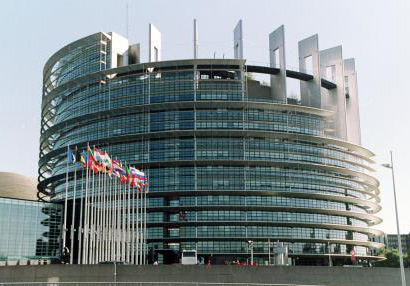
Sep 10, 2018 | Advocacy, News
The ICJ today called on all MEPs to vote in favour of the draft resolution and report by rapporteur Judith Sargentini MEP, before the European Parliament, which would activate Article 7 of the Treaty of the European Union in respect of Hungary.
A vote for the resolution would mean that, under Article 7.1, the Council would determine whether there is a clear risk of serious breach by Hungary of the founding values of the EU.
Ultimately, if the situation persists, this would allow the Council to take more robust measures, including suspension of voting rights, to address the situation.
The vote, scheduled for 12 September, is crucial for the rule of law in Hungary and throughout the European Union.
The Parliament will vote on whether to activate the process under Article 7, by calling on the Council to identify a risk of serious breach by Hungary of the EU’s founding values, including the rule of law and respect for human rights.
The ICJ considers that the measures put in place by the Hungarian government since 2011 have led to a severe deterioration of the rule of law and human rights, by weakening Constitutional rights protection, limiting judicial independence, suppressing independent media, civil society and academic institutions, and imposing arbitrary laws that violate the human rights of marginalized sections of society.
Cumulatively, these measures pose a grave, systemic threat to the protection of the human rights of all people in Hungary.
“The European Parliament should respond to the critical situation in Hungary by using the powers available to it under Article 7 TEU to defend human rights and the rule of law. Not to do so would be to abandon Hungary to an increasingly dangerous path, and would set a damaging precedent for all of Europe,” said Róisín Pillay, Director of the ICJ Europe Programme.
Read the full statement and key concerns here: Hungary-triggering Art 7-Advocacy-2018-ENG (in PDF)
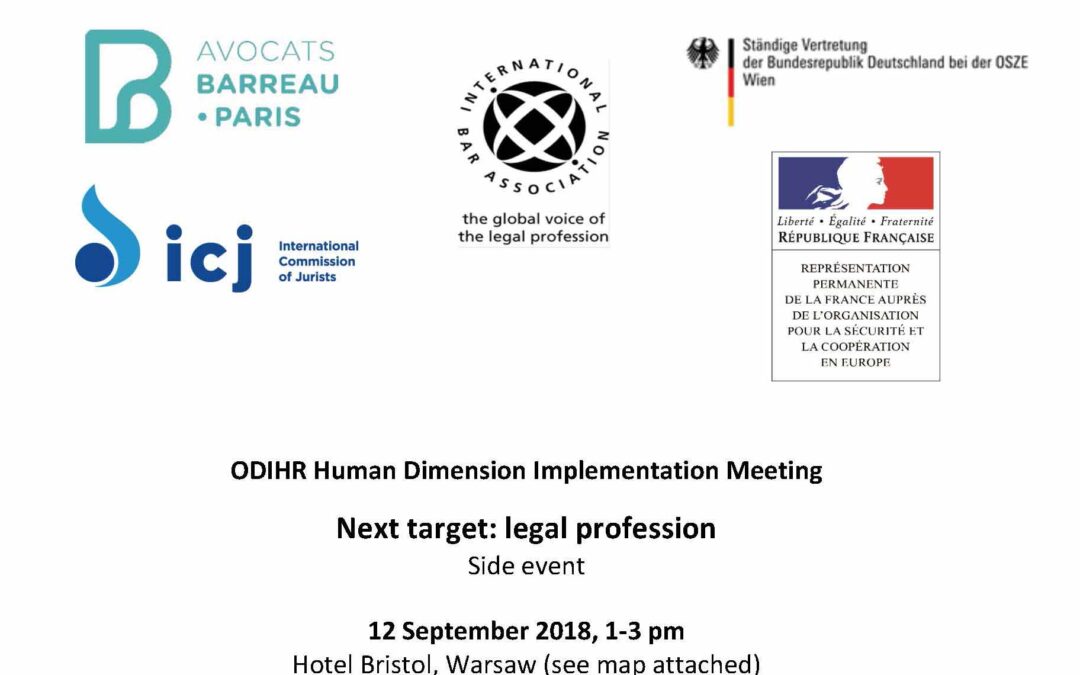
Sep 10, 2018 | Events, News
The legal profession plays a crucial role in ensuring access to justice for all, transparency and accountability of the state, Rule of law and the respect for human rights.
Yet, instead of being perceived as a vital player to the justice sector, today lawyers are often targeted by the governments in many OSCE countries for seeking truth and justice. As a result, lawyers often face high risks of persecution, harassment as well as severe sanctions for doing their job.
This side-event aims to specifically discuss the situation of lawyers in Belarus, Russia, Azerbaijan, Tajikistan and Kazakhstan. The discussion will extend to consider the latest developments related to the rights of lawyers and their independence in the respective countries, and what impact this has on the overall rule of law and human rights situation.
This side event will take place on 12 September 2018, from 13.00 -15.00 at Hotel Bristol, Warsaw
Moderator: Jurate Guzeviciute, Programme Lawyer, International Bar Association’s Human Rights Institute
Presentations and Discussions:
Independence of the legal profession and harassment of lawyers in Eastern Europe and Central Asia:
- Tajikistan: Dilrabo Samadova, lawyer, Tajikistan
- Azerbaijan: Nijat Mammadbayli, lawyer, Azerbaijan
- Kazakhstan: Snezhanna Kim, lawyer, Kazakhstan
- Russia: Róisín Pillay, Director of the Europe Regional Programme, International Commission of Jurists
- Belarus: Anne Souléliac, Head of the Human Rights section, Paris Bar Association
Organizers: Permanent Mission of the Federal Republic of Germany to the OSCE, Permanent Representation of France to the OSCE, International Bar Association’s Human Rights Institute, Paris Bar Association, International Commission of Jurists.
Poland-HDIM_Side event-News-event-2018-ENG (flyer of the event in PDF)

Sep 6, 2018 | News
The ICJ welcomed the Supreme Court’s judgment in Navtej Singh Johar et al v. Union of India and others, which effectively ends the threat to a large segment of the Indian population that they will be held criminally liable for exercising their human rights.
The Court has issued a long-overdue ruling that the criminalization of consensual same-sex relationships under Section 377 violates the Indian Constitution, and is in breach of India’s obligations under international law. This long-awaited judgment testifies to the work of activists and lawyers in India, who have shown the potential of the law to affirm human rights and equality.
“This judgment will not only have an impact in India. Its influence should extend across the world. The ICJ hopes that it will provide an impetus for other countries, especially those of the Commonwealth of Nations, to revoke similar provisions that criminalize consensual sexual relations,” ICJ Asia Pacific Director Frederick Rawski stated.
The Court underscored that provisions of Section 377 contravened international law and standards on equality, privacy, non-discrimination and dignity guaranteed in international human rights treaties to which India is a party. These include the International Covenant Civil and Political Rights and International Covenant on Economic Social and Cultural Rights.
The Court also noted that the Yogyakarta Principles, which address sexual orientation and gender identity in international law, reinforce these protections. This is a vital jurisprudential recognition that LGBTI persons are entitled to full equality, and protection of their rights under India’s Constitutional and international human rights law.
In the judgement, which reverses the December 2013 Koushal decision, the Court held that discrimination based on sexual orientation is a violation of fundamental rights to autonomy, privacy, equality, dignity, and non-discrimination. It underscored that decriminalization of homosexuality is only the first step and that LGBTI persons are entitled to equal citizenship in all its manifestations. The Court also recommended that wide publicity be given to judgment to ensure de-stigmatization of identity through sensitization training on barriers to access to justice faced by LGBTI persons.
“Even a landmark decision by the Indian Supreme Court cannot alone end the discrimination against people based on their sexual orientation or gender identity. It is time for the Indian Parliament to conduct wide-ranging review of existing legal framework, repeal discriminatory laws, and address other gaps in the law that prevent LGBT persons from fully exercising their rights,” Rawski added.
Background
For background, see the ICJ’s July 2018 Briefing Paper on Navtej Singh Johar et al. v. Union of India and Others, and its February 2017 report, “Unnatural Offences”: Obstacles to Justice in India Based on Sexual Orientation and Gender Identity.
Contact
Maitreyi Gupta (Delhi), ICJ International Legal Advisor for India
e: maitreyi.gupta(a)icj.org, t: +91 7756028369
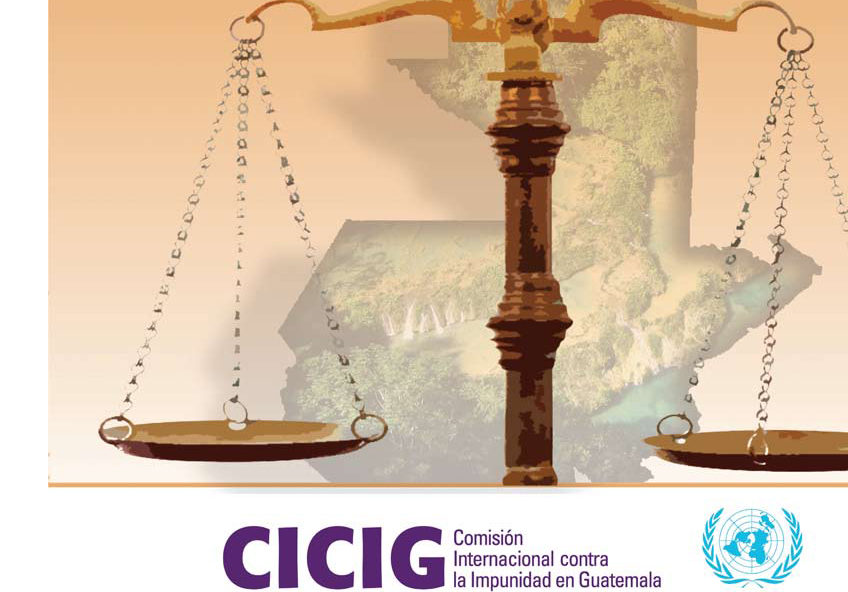
Sep 5, 2018 | News
The ICJ today signed a joint statement with other international organizations based in Europe that cooperate on Guatemala condemning the decision of Jimmy Morales not to renew the mandate of the International Commission against Impunity in Guatemala (CICIG).
The statement also repudiates the subsequent decision by President Morales to bar the CICIG Commissioner Iván Velásquez from returning back to the country.
The CICIG has made a significant contribution to the work of the Public Prosecutor’s Office, the strengthening of the rule of law and the fight against corruption networks.
The statement expresses grave concern that on 31 August 2018 the government used tanks and heavily armed policemen to intimidate CICIG personnel as well as Guatemalan citizens, while announcing the decision not to renew the mandate of the CICIG. “The image of President Jimmy Morales surrounded by the military and police at the press conference evokes the memory of the coup d’état and the military dictatorships during the dark years of the internal armed conflict,” the statement adds.
The organisations signing the statement call on the European Union and its Member States to demand that the state of Guatemala complies with its international obligations and guarantees the necessary conditions for Commissioner Iván Velásquez and the CICIG to continue their work safely and independently.
The full statement is available here: Guatemala-Statement on decision about CICIG and Velasquez-News-2018-ENG
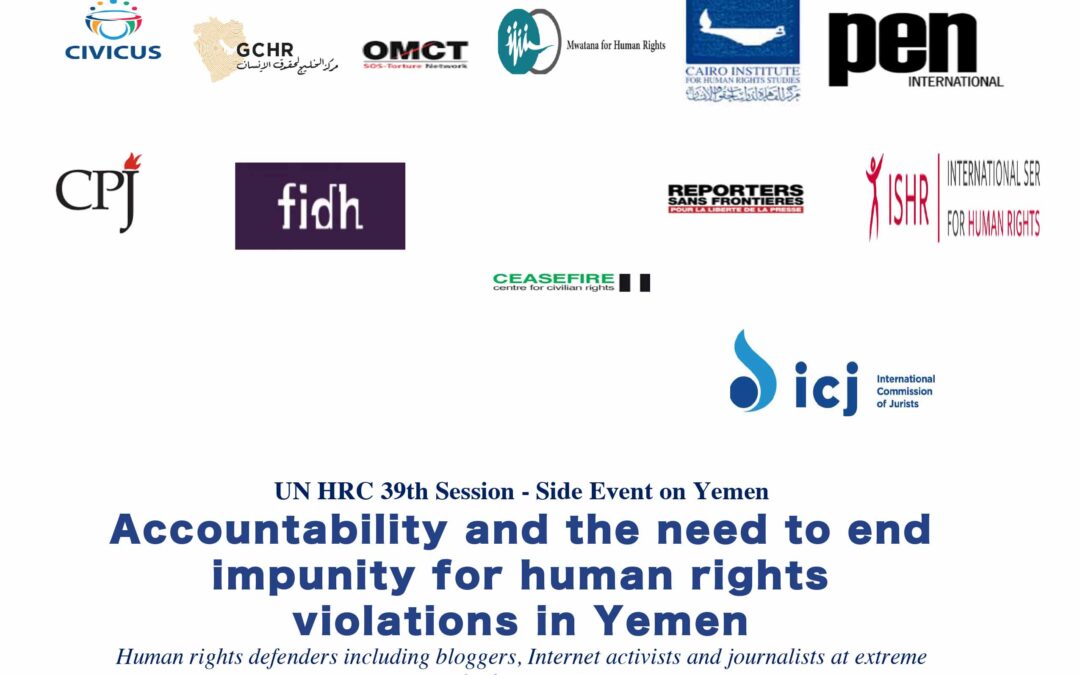
Sep 5, 2018 | Events, News
The ICJ will participate in the side event “Accountability and the need to end impunity for human rights violations in Yemen,” organized by the CIVICUS, FIDH, CIHRS in cooperation with Mwatana for Human Rights and the Gulf Centre for Human Rights (GCHR).
This side event at the Human Rights Council will take place on Monday, 10 September 2018 from 12:00 – 13:00 in room XXIV of the Palais des Nations.
The issue of human rights defenders including bloggers, Internet activists, and journalists who are at extreme risk of persecution will be discussed.
Speakers:
- Radhya Al-Mutawakel, Co-founder and Chairperson of Mwatana for Human Rights
- Khalid Ibrahim, Executive Director, Gulf Centre for Human Rights (GCHR)
- Vito Todeschini, Associate Legal Adviser, International Commission of Jurists (ICJ)
- Miriam Puttick, Head of MENA Programmes, Ceasefire for Civilians Rights
Moderator:
Antoine Madelin, International Advocacy Director, International Federation for Human Rights (FIDH)
Yemen-Side event at HRC-News-events-2018-ENG (download the flyer)










